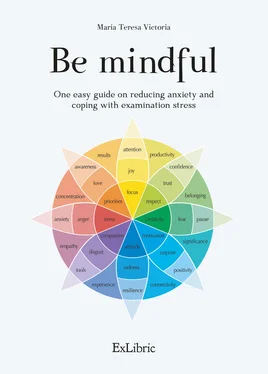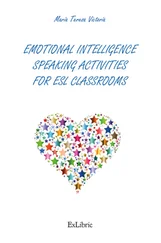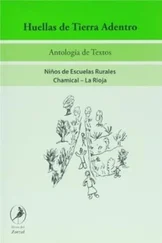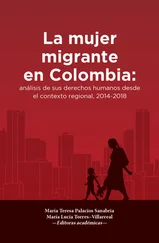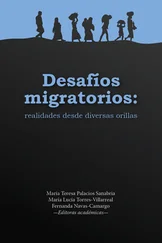
One easy guide on reducing anxiety
and coping with examination stress
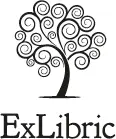
MARÍA TERESA VICTORIA

One easy guide on reducing anxiety
and coping with examination stress
EXLIBRIC
ANTEQUERA 2021
BE MINDFUL. ONE EASY GUIDE ON REDUCING ANXIETY AND COPING WITH EXAMINATION STRESS
© María Teresa Roura Vivas
© de las ilustraciones: Pixabay, Jon Davis (Advocate Art)
Diseño de portada: Dpto. de Diseño Gráfico Exlibric
Iª edición
© ExLibric, 2021.
Editado por: ExLibric
c/ Cueva de Viera, 2, Local 3
Centro Negocios CADI
29200 Antequera (Málaga)
Teléfono: 952 70 60 04
Fax: 952 84 55 03
Correo electrónico: exlibric@exlibric.com
Internet: www.exlibric.com
Reservados todos los derechos de publicación en cualquier idioma.
Según el Código Penal vigente ninguna parte de este o
cualquier otro libro puede ser reproducida, grabada en alguno
de los sistemas de almacenamiento existentes o transmitida
por cualquier procedimiento, ya sea electrónico, mecánico,
reprográfico, magnético o cualquier otro, sin autorización
previa y por escrito de EXLIBRIC;
su contenido está protegido por la Ley vigente que establece
penas de prisión y/o multas a quienes intencionadamente
reprodujeren o plagiaren, en todo o en parte, una obra literaria,
artística o científica.
ISBN: 978-84-18912-09-2
MARÍA TERESA VICTORIA

One easy guide on reducing anxiety
and coping with examination stress
Índice
Prologue
Foreword
Mindfulness: definition and concept
Introduction
Session one: from doing to being
Session two: befriending silence
Session three: attention regulation
Session four: emotion regulation
Session five: exam time management
Session six: cultivating resilience
Session seven: loving kindness
Session eight: closing up
Programs and Interventions of Mindfulness in Education
Acknowledgements
Bibliography
Prologue
María Teresa Roura Vivas has been trying to help her students get their best results in standardised tests since the Junta de Andalucia new regulations in 2012. It was a major task for her to try and de-stress classroom climates during examination periods for which reason she trained her students well beforehand on how to regulate high emotions and feelings of anxiety.
As a professional it felt extremely frustrating for her to see well-prepared students, who had worked hard all through their academic course, failing to sit their final exams or simply just giving in at the last minute or not turning up (specially at their oral examinations). This gave her the determination to continue her research on discovering optimal ways, tools and strategies that students could hold on to during high peaks of anxiety in exam period. Coping mechanisms to deal with those hard instances of examination stress and finally manage to concentrate and focus on doing their best and getting the best result possible. That is how Be Mindful was born.
Based on the PINEP program (below) which she became familiar with during her postgraduate Master’s studies at the University of Málaga (2018), One easy guide on reducing anxiety and coping with examination stress offers applicants to standardised ESL tests worldwide, a brief introduction to the origins of the millenary practice of Mindfulness where the user will learn how to befriend silence and slowly encounter their own ability to focus using simple concentration techniques that will help them become more aligned and focused through basic breathing exercises.
Potential examinees will also navigate through uncomplicated attention and emotion self-regulation practices that will help them later on during high moments of examination stress or anxiety when they need the support. The intention of all this being to achieve the best result possible. These comments from students acquiring the practice speak by themselves: ‘I feel relaxed and energized after the practice, fully recharged to start work’ or ‘Great practice. It gets easier and feels better each time. These techniques are not only good for oral exams!’ and ‘Mindfulness practices help clear my mind and fully concentrate’ as well as ‘Mindfulness practice helps us to be more calm and confident. A very positive experience indeed’.
As the author herself points out one good benefit of Mindfulness practice that comes alongside decreased stress is productivity, which will surely stay with those who decide to put this useful guide in their pockets. The reader of these guidelines for language users and university applicants of standardised English tests may grow more creative, will be shown some cultivating resilience practices and learn about self-compassion becoming a must-have, or how loving kindness exercises might help their own personal and professional growth and self-development.
“With the idea of facilitating the regulation of emotions through mindfulness, the Mindfulness and Emotional Intelligence Program was developed. PINEP can be defined as a conscious emotional management program whose objective is to help participants in the process of `learning to feel´, and to provide individuals with sufficient resources to accompany their own emotional states and those of third parties. This could result in their becoming aware of the mechanisms which inhibit the achievement of personal goals in situations of high emotional intensity, and thus restore the adaptive value of an emotion. This implies that PINEP, through the formal and informal practice of mindfulness, helps the individual to deal with highly emotional situations” by Ramos NS; Enríquez, H and Recondo, O. (2012) Inteligencia Emocional Plena. Mindfulness y la gestión emocional de las emociones. (Edición Revisada). Barcelona: Kairós.
Ph. D. Natalia Sylvia Ramos-Díaz, Director of Master
Studies in the Mindfulness and Emotional Intelligence
Program, Professor at the Faculty of Psychology,
University of Málaga (Spain).
Foreword
The Emotional Intelligence courses undertaken since the beginning of my career as an English teacher came to a turning-point during the PINEP Program run at the Teachers Training Centre CEP Marbella-Coin in 2018 (Reference: 182923GES251).
The contributions of the PINEP program proved to be the most interesting to top up the experience I had built up as an emotional intelligence practitioner in the English classroom since 1993. The program’s proposals and techniques were developed within B1 Certificate candidates in 2018 focusing mainly and most importantly on how to improve my students speaking competence and skills. So some innovative Mindfulness and Emotional Intelligence activities and interventions were brought into the classroom to build up new strategies for the students to tackle their final speaking examination tasks.
The 2018 experience helped candidates [1] FOCUS ONLY on the interactive task with their partner, and nothing else (nervousness, the unexpected, unwanted topics, unusual partners, etc); [2] GET RID of distractions and/or insecurities; [3] BECOME AWARE of their own speaking productions and of pointing out at the most useful items to deliver their best Monologues and Dialogues; [4] REDUCE stress and, [5] CONCENTRATE on speech.
Читать дальше
